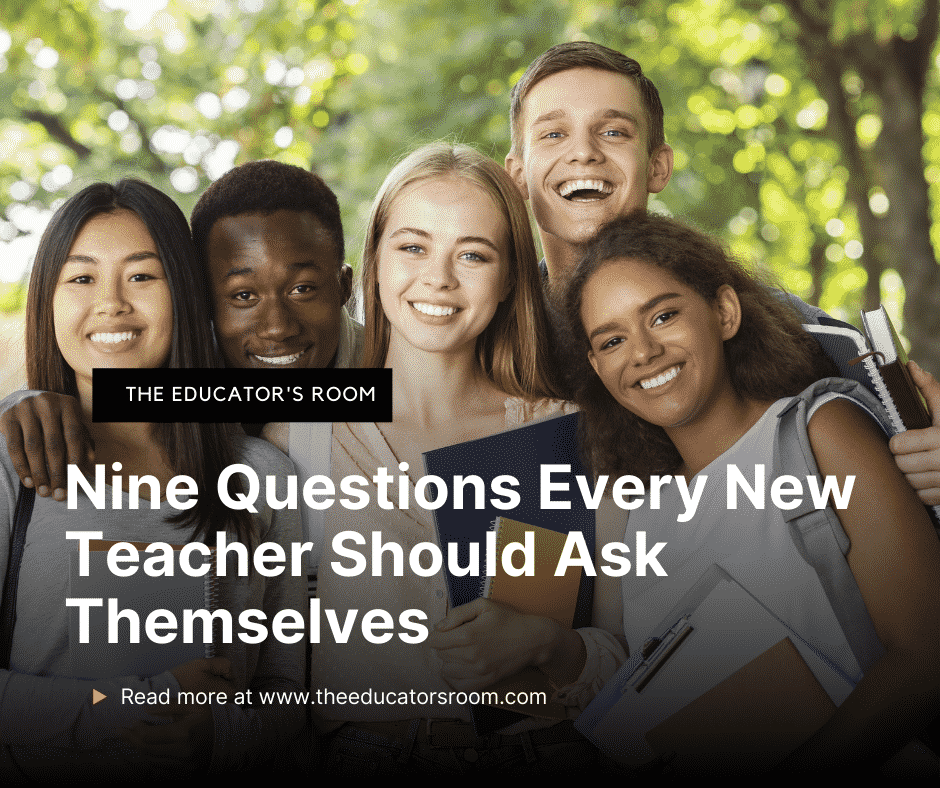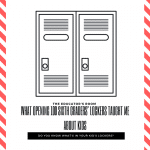You’ve started your first year, and it has been a whirlwind – but now what? Between the chaos of the school day, required training, and drop-in observations, you probably haven’t had much time to reflect or take a breath. Yet, reflection as a new teacher is one of our most excellent tools to improve our craft, and the best way is to ask yourself some thought-provoking questions. These are the question every new teacher should ask themselves:
What do I want to be known for as a teacher?
In the eyes of those around you, what do you want to be known for or remembered at your school? This is important in deciding the value you want to bring to your school while also ensuring you are not falling into the “perfect teacher” traps. For example, being the last one to leave may make you seem like a hard worker, but is that the only way to be seen as a hard worker? This question also needs to be considered at multiple levels – think about how you want to be known by peers, admin, and students.
- Do you want to be known as the teacher who makes rude comments or do you want to be known as the teacher who is always excited to see their kids?
- Do you want to be known as the teacher down the hall who never puts in for a sub and has others cover your classes, or do you want to be known as the teacher who volunteers to help at events other departments host?
- Do you want to be known to the admin as the teacher who always sends kids out you don’t know how to deal with, or do you want to be known as the teacher who seeks answers and mentorship before problems arise?
These things will follow you as a teacher, and what you are known for can affect the future of your career, from getting the next contract to being department head.
Who am I serving?
As teachers, we are public servants. We do what we do for little money and recognition because we know how vital our role is. With that, though, we must never forget who we ultimately serve – the students. It can be challenging as a new teacher when there is pressure from admin, parents, school boards, department chairs, etc., to remember why you are there in the first place. However, I firmly believe that when you do what is best for the students, you can always walk away knowing you did the right thing. So when you feel the pressure to do something a certain way, ask yourself if you think it will benefit your students. If it won’t, then push back. When you feel stressed out from the pressure, ask yourself if you have been there for your students. If you have, then you are heading in the right direction.
Am I authentic?
The quickest way to lose your students is by not being authentic. Even the youngest kids can tell when you act fake or put on a show – and they will shut down or turn away. Therefore, it is essential for a teacher to be authentic, which means being yourself and honest with your students. They will not buy in if they can see that you are phony, and it won’t be gratifying for you if you always have to wear a mask at work. If you are the off the walls, excitable teacher with endless energy – then be that! If you are cool as a cucumber, soft-spoken, but incredibly wise teacher – then go ahead and be that! There is no right or wrong personality in the classroom if you are being yourself and helping the students learn.
What impact am I having?
As a teacher, you have many options for how you can impact your students and the school. There are clubs, sports, events, fundraisers, etc., that you can be involved in, plus other ways to make change happen on your campus. If you want to be the teacher who shows up, is in their classroom all day, and goes home, that is fine, but ask yourself if your impact has to be limited to the four walls of your classroom. If there is a void that could be filled on your campus by starting a new club, then you should be looking for ways to make it happen. If there is a school-wide issue that you have ideas for improvement, you should set a meeting with the principal and tell them. Finally, if there are opportunities to be a part of the school community (going to sports games, seeing student performances, attending the weekend carwash), make yourself a part of it. These things go such a long way in building relationships with students, strengthening school bonds, and improving the campus as a whole.
Do I build relationships with all of my students?
I am sure you have heard it a million times – relationships are everything. And they are! But more importantly, are you reaching every student in this aspect? I know it can be tough when you have 150 students coming in and out of your classroom every day, especially when there are frequently absent or extremely quiet kids. But it is your responsibility to make connections with every student, and sometimes we let some fall through the cracks at first. That is why it is so important you ask yourself this question often. Sometimes we have students who are receptive initially but then pull away from us – how are you going to continue building that relationship?
In what ways do I reflect on my teaching?
Being an effective teacher comes down to the meaningful reflection of your practices. Every teacher handles their thinking differently, but you must have a method for doing it to keep improving. When I was a student teacher, I had a notebook where I wrote reflections every single day. I did not always have time for that when I had my classroom, so I would write notes on my lesson plans at the end of each week about what I could adjust to improve them. At the end of the year, I thought of what I would have done differently on a larger scale and wrote all those down. When I was about to start my second year, I read all of those reflections and made sure I did not repeat mistakes. It is also a great way to track progress by seeing the silly things you used to do compared to how you currently do things!
What do I value in a school?
Sometimes our first teaching job is not our dream job. I think many new teachers become disenchanted by this fact, but the reality is when you don’t have any experience, you cannot always be picky, and you don’t know the red flags yet. As you are going through your first year, pay attention to the things that make you uncomfortable or don’t sit right – this will tell you what you value in a school. Sometimes, you may want to switch schools or districts after your first year, and that is fine. Other times, you may stay with the devil you know rather than risk the one you don’t. However, there is nothing wrong with understanding what you do and don’t like in schools and finding a school that is a good fit. For example, some teachers love common prep time with their department and want ample time for PLC’s – others may not care at all. Or maybe you love technology integration, so you must be at a school that is 1:1 even though some other teachers don’t need that level of tech in their room. Maybe you like being somewhere that allows you to push for campus-wide change, while other teachers don’t want the extra work of doing so. We all want different things, but we all deserve to be at a school that is a good fit.
Am I taking care of myself?
Teacher self-care is now a pretty mainstream idea, but we sometimes let things get away from us. Especially as a first-year teacher, there is a lot of stress, and you may feel incredibly overwhelmed and not realize it. Make sure you always take care of yourself. You cannot be an effective teacher if you do not take care of yourself first. It would help if you were regularly eating, getting enough sleep, making time for yourself, turning off your work brain to relax, etc. If you do not do these things, you will very quickly burn out, and losing great teachers is all too common.
Do I love what I do?
This is the question that may shatter some psyches. But ask yourself if you love what you do as a first-year teacher. You do not have to love every part of your first year because we all know it is a complete whirlwind experience. But can you imagine yourself doing this for years to come? Do you enjoy coming to work every day? Do you like working with students? And if you think you are answering no to these questions, then ask yourself why. Maybe you have had a challenging year in your personal life, so your experience was hindered for other reasons. Perhaps you dreaded going to work because of complex admin, but that doesn’t necessarily mean you hate teaching. But if you do not love the core of teaching: sharing your knowledge with students, spending time working with kids, building those relationships – then maybe it is time to move on.
Remember to ask yourselves these questions repeatedly throughout the year, and pay attention to how the answer changes. Of course, you won’t get things perfect the first, second, or probably one-hundredth time, but the kids need someone who cares and wants to grow. Good luck out there!






